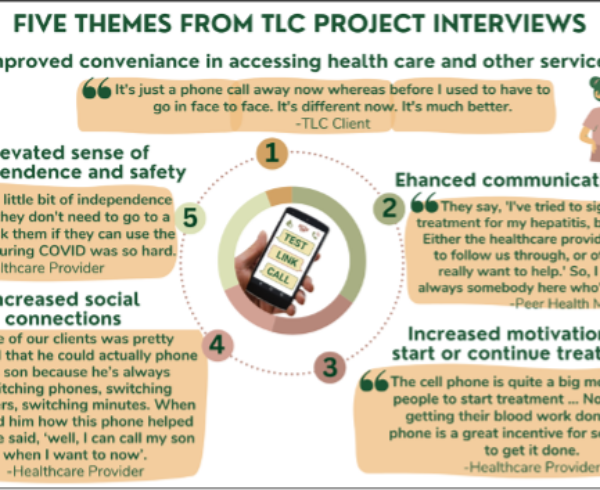
SEPTEMBER 5, 2024. By Amrit Tiwana, Nicola Gale, and Sofia Bartlett. People who experience criminalization, such as those who have been incarcerated,Read more
The ADVANCE COVID-19 Vaccines Study conducted focus groups and surveys with people with lived and living experience of incarceration in BC Provincial Correctional Centres during the COVID-19 pandemic. This allowed us to gain a better understanding of the experiences of people in prison during this time, as well as their knowledge, attitudes and beliefs about COVID-19 and vaccines.
We then co-designed this series of educational resources with people who were incarcerated in BC Provincial Correctional Centres to address the issues that they identified as the biggest concerns for people in custody.
All the educational resources posted here can be downloaded, or if you would like to order printed copies, please email STBBI_Pathways@bccdc.ca to request this.
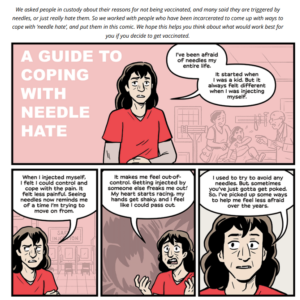
During focus groups and in surveys conducted as part of the ADVANCE Study, we asked people in custody about their reasons for not being vaccinated. Many people said they avoid needles unless absolutely necessary, as they find them triggering or create unpleasant feelings. So we worked with people who have been incarcerated to come up with ways to cope with ‘needle hate’. We also looked to peer-reviewed, published evidence and guidelines about how healthcare providers can improve the experience of being vaccinated for people who fear or dislike needles. We put all of this information together in a comic, because people who are incarcerated told us that this would be a medium they would find engaging and accessible. While the strategies suggested in this comic may not work for everyone, the conversation that is depicted can serve as a model for how an individual can ask for the accommodations that would work for them, or that they would prefer, when they are getting vaccinated.
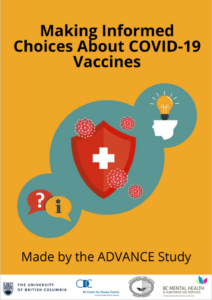
We co-designed this booklet with people who were in custody in a BC Provincial Correctional Centre during the COVID-19 pandemic. The booklet addresses the concerns that people who were incarcerated had about COVID-19 vaccines that were identified through the ADVANCE COVID-19 Vaccines Study.
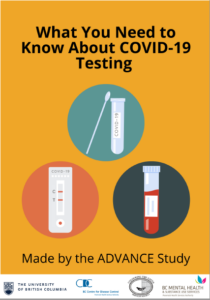
We co-designed this booklet with people who were in custody in a BC Provincial Correctional Centre during the COVID-19 pandemic. The booklet addresses the questions and concerns that people in custody had about COVID-19 testing that were identified through the ADVANCE COVID-19 Vaccines Study.
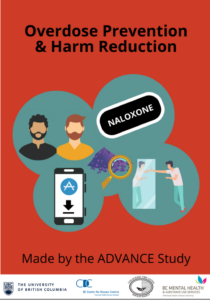
We co-designed this booklet with people who were in custody in a BC Provincial Correctional Centre during the COVID-19 pandemic. The booklet addresses the concerns people in custody had about the risk of accidental drug overdose after release from custody that were identified through the ADVANCE COVID-19 Vaccines Study.

We asked people who were incarcerated provincially in British Columbia what myths they have heard about COVID-19 and vaccines. We collected these all together to make a list of the most frequently heard myths. We then asked experts to help ‘bust the myths’, then put all this info into these posters. We got feedback about the way the info on the posters was worded, as well we the design and overall look of the posters from people who were incarcerated provincially in British Columbia, to help us make the posters as easy to understand, as appealing as possible.
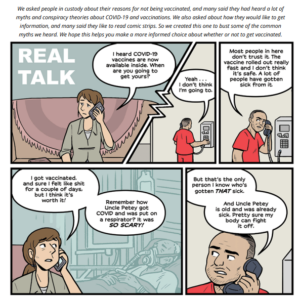
During focus groups and in surveys conducted as part of the ADVANCE Study, we asked people in custody about their reasons for not being vaccinated. Many people we heard from said they had heard a lot of myths and conspiracy theories about COVID-19 and vaccinations while they were incarcerated. We also asked about how they would like to get information, and who they trust information from , and many said they like to read comic strips. So we created this comic to bust some of the common myths we heard, and show these in a conversation. The educational resources created from the ADVANCE Study are specifically aiming not to try to convince or coerce people who are incarcerated to make a certain choice about whether or not to be vaccinated, but trying to encourage them to be informed when they make their choice. Informed decisions are decisions that are based on facts and evidence, not objective opinions, myths or rumours.
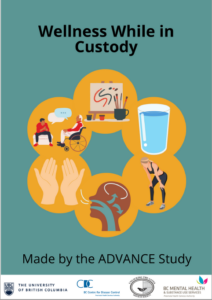
We co-designed this booklet with people who were in custody in a BC Provincial Correctional Centre during the COVID-19 pandemic. The booklet addresses the concerns that people in custody had about how to maintain their health and wellness during incarceration that were identified through the ADVANCE COVID-19 Vaccines Study.

We co-designed this booklet with people who were in custody in a BC Provincial Correctional Centre during the COVID-19 pandemic. The booklet addresses the concerns that people in custody had about how to access services after release from custody that were identified through the ADVANCE COVID-19 Vaccines Study.
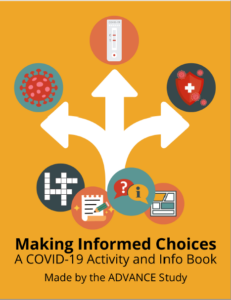
We co-designed this workbook with people who were in custody in a BC Provincial Correctional Centre during the COVID-19 pandemic to address the questions and concerns that people in custody had about COVID-19 vaccines, testing, and many other issues. It uses didactic activities such as word searches, word jumbles, and crosswords to make learning interactive.
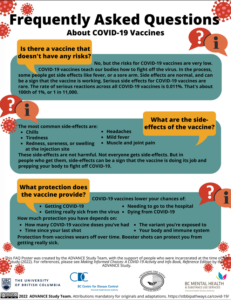
We asked people who were incarcerated provincially in British Columbia what questions they have about COVID-19 and vaccines. We collected these all together to make a list of the most frequently asked questions. We then asked experts to help answer these questions, then put all this info into these posters. We got feedback about the way the info on the posters was worded, as well we the design and overall look of the posters from people who were incarcerated provincially in British Columbia, to help us make the posters as easy to understand, as appealing as possible.
The News & Stories page include blogs written by team members, news, project updates and past and upcoming events.

SEPTEMBER 5, 2024. By Amrit Tiwana, Nicola Gale, and Sofia Bartlett. People who experience criminalization, such as those who have been incarcerated,Read more
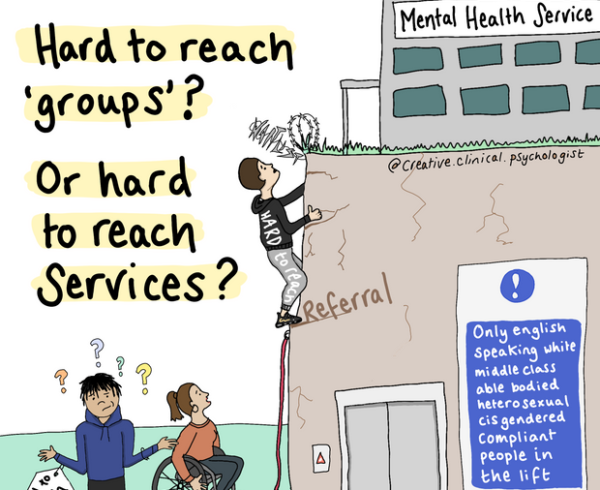
AUGUST 2024. By Nicola Gale, RPh (APA), MPH. More about Nicola Gale. Nicola Gale is a clinical pharmacist with an out-patient liverRead more
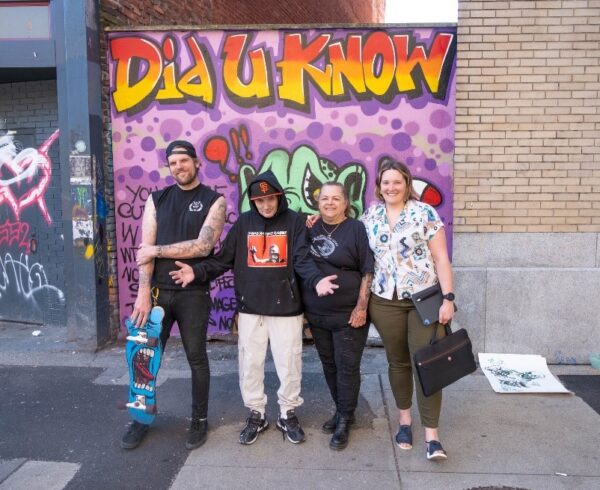
By Pacific Public Health Foundation NOVEMBER 8, 2023, Pacific Public Health Foundation Test, Link, Call: a simple premise with a powerful purposeRead more

By BC Ministry of Health JULY 30, 2023, BC Ministry of Health Communications People in B.C. will be better protected against theRead more

The You Matter Pathways to STBBI Care project is funded through the Public Health Agency of Canada …

We recently received funding for the Test, Link, Call (TLC) Project which will be launched in Fall 2021 …
Link to conference
https://www.aasld.org/the-liver-meeting/program/digital-experience
